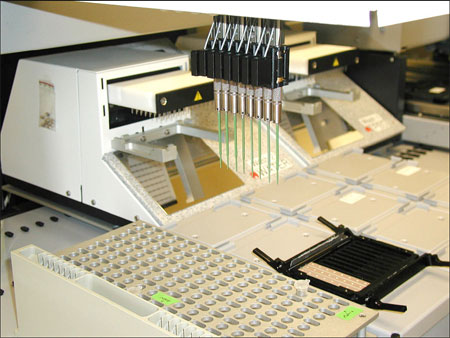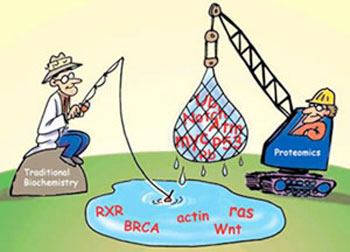- To ensure quality laboratory testing, standard collection and testing of samples should be adapted. -
Clinical Laboratory Improvement Amandment,
(CLIA) labs require this but most
research labs do not practice CLIA regulations or hire CLIA licensed employees.
Cost is the primary concern. This was never a problem in basic research labs but
as research findings have more relevance to patients (biomarkers) this becomes a
prime issue.
All clinical laboratory tests (hemoglobin, cholesterol, white or red blood cell
count and 100's of others) that can be used to determine patient status and
treatment, by law must be tested following CLIA regulations - biomarkers are not
yet required by law to follow CLIA regulations for testing but are moving in that
direction.
- Validate all kits and tests
The Future of Proteomic-Based Research
The accessibility of cancer-related proteins in bodily fluids and tissues has triggered
extensive protein-focused research. But a lack of reliable methods for protein
identification and measurement has led to pervasive problems with reproducibility and
comparability of research results.
 |
|
The TECAN Genesis 2000 robot
preparing Ciphergen SELDI-TOF
protein chips for proteomic
pattern analysis.
The hope is that cancer
prognosis can be accomplished
by identifying protein patterns of
specific cancers using this device
or ones like it. |
| Image provided by CISN archives. All rights reserved. |
|
|
| |
|
|
Proteomic Technologies: more about these in the 'How Cancer Is Studied' section
- Mass Spectrometry: Detects and identifies ever-smaller amounts of proteins.
- Protein Microarrays: Powerful tools for capturing and measuring proteins from
blood and other body fluids and tissues.
- Nanotechnologies: Greatly expands the capabilities of proteomics, addressing
current limitations in selectively reaching a target protein in vivo.
- Bioinformatics: Enables collection, analysis and sharing of huge amounts of data
for inter-institutional studies.
- Biospecimens: The critical need for research access to large numbers of highquality
biospecimens annotated with clinical data.
- Reagents: A growing need for high-quality, standardized reagents (substances
used in experiments) that can improve proteomic technologies' specificity and
reproducibility.
Proteomics Research Projects or Efforts:
These projects are included as examples of where the science is
leading us.
1. Clinical Proteomic Technologies for Cancer (CPTC): Recognizing the promise of
clinical proteomics for personalized cancer care, the National Cancer Institute (NCI) has
taken a lead role in elevating the field by launching the Clinical Proteomic Technologies
for Cancer (CPTC) initiative in 2006.
The goal of the (CPTC) initiative is to foster the building of an integrated foundation of
proteomic technologies, data, reagents and reference materials, and analysis systems
to accelerate discovery and clinical research in cancer. To learn more about this
organization, go to: http://proteomics.cancer.gov/
2. Proteome Sciences: This is a for-profit company that offers high output proteomics
for diagnostic, prognostic & therapeutic applications.
3. Agilent Technologies: Agilent Life Sciences and Chemical Analysis is a for-profit
company. It is a leading global provider of instrumentation, supplies, software and
services to the life science and chemical analysis markets. They have a large
proteomics division.
4. Dualsystems Biotech: This is a for-profit company that is a leading provider of
custom services and products in the field of proteomics.
CISN Summary
- Proteomics is the study of the proteins in a cell, tissue or organism.
- Scientists are in the early stages of this work so only a small percentage of the
thousands of proteins in human cells have been sequenced or identified.
- Proteomics technology is being explored for potential use in cancer diagnosis
and treatment. This research involves searching for proteins that may serve as
biomarkers of early disease, responsiveness to therapy, or indicate the likelihood
of relapse after treatment.
- A high priority of current research efforts is the application of proteomics
technology to improving cancer diagnosis and monitoring of patients, in addition to
their care.
- Proteomics can help to find and measure which circulating proteins provide
evidence that a drug is or is not working.





